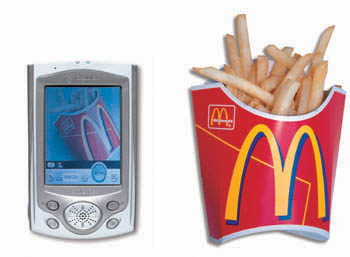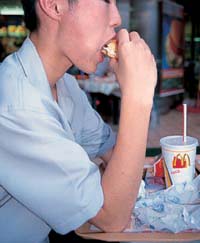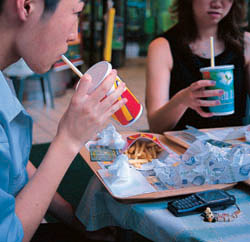Wireless and Fries
Back to Contents of Issue: September 2002
|
|
|
|
by Gail Nakada |
|
 HOT SPOTS ARE HOT stuff -- at least to marketeers. Mobile computing online in this country used to mean a stop at an Internet cafe
for a big gulp of wired access and roaming was something you did with your buddies on Friday nights in Roppongi. That's all changing now. Yano Research Institute estimates that in fiscal 2001 domestic sales of wireless LAN base stations hit 417,500 units with sales of wireless LAN cards at 672,500. Contrast that with 1999 when a scant 25,000 LAN cards sold and only 15,000 base stations. HOT SPOTS ARE HOT stuff -- at least to marketeers. Mobile computing online in this country used to mean a stop at an Internet cafe
for a big gulp of wired access and roaming was something you did with your buddies on Friday nights in Roppongi. That's all changing now. Yano Research Institute estimates that in fiscal 2001 domestic sales of wireless LAN base stations hit 417,500 units with sales of wireless LAN cards at 672,500. Contrast that with 1999 when a scant 25,000 LAN cards sold and only 15,000 base stations.Spurred on by lower prices for broadband services, anywhere/anytime online computing has begun moving into the mainstream. Press releases and projected tie-ups flooded news media during the spring, heralding a new era of burgers in one hand and wireless connectivity in the other. Coffee house chain Pronto was an early adopter, launching its first hotspot at the Pronto Akihabara outlet in December 2001 with Cisco's CMO (Cisco Mobile Office) Aironet. Plans are to rollout service slowly. "Akihabara was our test case for six months. It has proved very popular, you'd expect that given the location," says a Pronto spokesperson. "We planned on testing the service in five more Pronto locations in July and then a further 20 in the fall." In May, Mos Burger, a division of MOS Food Service, joined with NTT Communications in a planned launch of wireless Internet services at 150 outlets around Tokyo. Yumiko Matsuda of MOS Food's PR department calculates that 100 Mos Burgers were wired up by the end of June and the buzz from customers using it has been "positive." It's also a great deal for the food chain since NTT -- like other providers in these deals -- absorbs the cost of labor, installation and equipment, leaving MOS with nothing to pay but the electric bill. Other announcements followed but one -- between Tully's Coffee and Broadband e-Business (BeB) formed by a number of major IT firms including IBM Japan and Cisco Systems -- is under reconsideration. At press time, a spokesperson for Tully's admitted, "We're not sure at this point whether we want to pursue a wireless project or not." Free for All But what everyone wanted to know was who would sign fast-food heavy hitter McDonald's. With over 3,800 stores across the country, few have been as astute in gauging the wants of hungry diners in a hurry as the Golden Arches. Company statistics show around 1.318 billion people visited McDonald's in Japan last year -- that equates to more than 10 visits per year by every Japanese citizen. In May, Softbank announced it was the one to score the deal. Yahoo! Japan is managing the project's promotional Web site using its own content and services, while Softbank Commerce supports the overall project through management and consulting services. The project also provides public IP telephones via Yahoo! BB Phone at McDonald's restaurants, with a three-minute free call open to both subscribed and non-subscribed customers. It is, though, only a modest start. BB Mobile wireless LAN is installed at 10 shops in Tokyo, according to McDonald's spokesman Yoshiaki Okamoto. "Regarding BB Phones, we are testing at 60 stores nationwide," he says. The company is also offering free 3-minute phone calls at the 10 stores with hotspots until the end of the year. At the press conference for the project, McDonald's COO Yasuyuki Yagi hinted that the company might consider letting diners pay for meals via the BB mobile Net. McDonald's has since backed away from that statement, with company rep Okamoto saying they have "no plans" at this time for such an intimate tie-up. That same month Softbank and its group firms tied the knot with Osaka-based Duskin, the company behind the mister Donut franchises, for wireless Yahoo! BB broadband and phone with initial service at 20 donut shops in and around Tokyo. And on the 29th, Softbank also struck a deal with Starbucks to provide wireless Yahoo! BB at 29 Starbucks coffee locations for a six-month test period. For Internet newbies, "hotspot" is the latest buzz-term -- it refers to wireless access points, generally in public areas, such as airports, hotels, train stations and coffee shops. These wireless nodes typically provide an Mbps-class (over 1Mbps) Internet environment in a limited area. Unlike Internet cafe, these new services provide only connectivity. Users bring their own laptop/PDA equipped with LAN card or built in wireless access to log on with specific Internet providers. JR East and Japan Telecom, for example, provide wireless access through a number of major Tokyo and Yokohama stations. Initially limited to subscribers to ODN, now account holders with Matsushita's Hi-Ho, Dream Train Internet and @nifty from Nifty Corp. can log on as well. In the case of McDonald's, mister Donut or Starbucks, they must be a subscriber to Yahoo! BB's ADSL service.  For Softbank the success of the scheme is crucial. Analysts are less than impressed with much of its investment portfolio -- Yahoo! Japan notwithstanding. The company recently posted a group net loss of \88.76 billion ($689 million) for 2001/02 -- its first loss since going public in 1994. Softbank has begun divesting itself of non-performing investments to boost investor confidence and has set about transforming itself from an IT investor into a premium provider of low cost broadband and IP telephone services through the Yahoo! BB venture.
For Softbank the success of the scheme is crucial. Analysts are less than impressed with much of its investment portfolio -- Yahoo! Japan notwithstanding. The company recently posted a group net loss of \88.76 billion ($689 million) for 2001/02 -- its first loss since going public in 1994. Softbank has begun divesting itself of non-performing investments to boost investor confidence and has set about transforming itself from an IT investor into a premium provider of low cost broadband and IP telephone services through the Yahoo! BB venture.Tetsuya Nishimaki, executive director of Yahoo! BB Division, says, "Yahoo BB was the agent that sparked the fever of sign-ups. For Yahoo, the growth of the Internet in Japan into people's everyday life and homes is very important. Page views by broadband subscribers have increased nearly three times and the time spent online has doubled. Yahoo's price cut for ADSL has permanently altered the landscape." At a press conference in April announcing the Mos Burger tie-up, NTT declared it expected sales of JPY1 billion by fiscal 2003 and at least 100,000 subscribers. Yahoo! BB declines to predict either revenue or subscriber numbers. Why Bother? Given that broadband use is growing at a healthy rate, are Japanese consumers really going to flock to fast-food outlets and coffee bars for their mobile computing needs? Daniel Newman, communications analyst for IDC Japan, believes it's just a matter of time. "In four years this kind of service will be a given. These companies are saying 'well, we have the technology now so we might as well go ahead.' But when you get down to it just because you have the technology to do something doesn't mean it's what the market wants at this time." From a Japanese consumer perspective, mobile computing requires a huge alteration in behavior. This is a public transportation society. Though PDAs are growing in versatility, most mobile wireless is still via laptop -- a weight that has to be lugged around all day on buses, on trains, up stairs and down. There's a growing segment of businesspeople who do just that and that niche needs these kinds of services, but the average consumer? Email may be a terribly attractive feature for wireless connections, yet a high proportion of Japanese going into venues like mister Donut and McDonald's are young people who already have their cellphones for much if not all of their emailing needs. "Where is the compelling argument to say these people are going to want to watch movie or video clips -- which is what high speed connections are partially designed for -- in a fast-food environment?" asks IDC's Newman. Add to that the concerns over the very basic need for an electrical outlet -- a rare commodity at most eating venues. People logging on, searching for a LAN connection, downloading data, are sucking even more energy from their laptop's batteries than conventional computing, meaning two hours of life or less for many units. Don't expect help from the eateries -- no one has plans to rip out walls and install more outlets, since the prime attraction here is the lack of cost involved for all partners. Security too is -- or should be -- a real worry (see Drive-By Hacking, page 30). If someone sniffs out your wireless connection and goes on to destroy your corporate network because you're getting a burger, what are you going to do? Mos Burger or whoever can't be held responsible. Yahoo! spokesman Masanori Satake says, "We aren't trying to back away from responsibility but ultimately it lies with the user. We have to both educate and warn consumers that despite our taking every precaution, there is an element of risk." If the public is not clamoring for access, how have fast-food chains and coffee houses been beguiled into thinking wireless LAN connections are going to bring diners into their establishments? "There's a lot of fear," says IDC's Newman. Choosy Customers Last year's BSE scare and several current scandals involving illegal additives or preservatives have dropped fast-food revenues right down. Even though McDonald's beef is from Australia, the company had to shoulder costs for a huge unexpected advertising campaign designed to restore consumer confidence. McDonald's revenue share climbed a scant 1.1 percent year on year for 2001. Over at Mos Burger, the fiscal 2001 report shows net sales decreased 4 percent from the previous fiscal year to $464 million. Same-store sales decreased some 8.5 percent with 59 openings and 54 closings making a net store increase of only five. Mister Donut is in deep donut doo-doo following the discovery that the company knew that the banned additive t-butyl hydroquinone was in some products yet kept right on selling. Company president Takeshi Ueda has since announced a voluntary moratorium on opening any new outlets until March of next year.  The changing palates and shrinking purses of Japanese consumers have slowly transformed the shape of the fast-food industry here over the past several years. Starting in February 2000 fast-food chains slashed prices and have more recently expanded menus in a battle with convenience stores and coffee houses for a share of the more than \1 trillion fast-food market. If "hotspot" is the buzz in the Internet world, then "value added" has become fast food's current mantra. It's an elusive goal with the right combination constantly changing. Low prices, the chains found, proved only a partial fix.
The changing palates and shrinking purses of Japanese consumers have slowly transformed the shape of the fast-food industry here over the past several years. Starting in February 2000 fast-food chains slashed prices and have more recently expanded menus in a battle with convenience stores and coffee houses for a share of the more than \1 trillion fast-food market. If "hotspot" is the buzz in the Internet world, then "value added" has become fast food's current mantra. It's an elusive goal with the right combination constantly changing. Low prices, the chains found, proved only a partial fix."There's the good, the bad and the ugly in pricing and quality here in Japan and each one has varying degrees of success at different times," says Benjamin Warner, co-president of Benugo Japan, an award-winning line of gourmet deli coffee and sandwich shops from the UK opening in Japan early this fall. "Nowadays you can have a coffee and sandwich for just \300 at one chain. Or you could go into Starbucks. There all you'll get is a cup of coffee for that price. But if you're a young Japanese, you're proud walking down the road holding that Starbucks cup -- it was worth the extra cost for the cool factor. Long-term success in vast segments of the food industry here is not just based on cheaper prices. Japanese are of course extremely image and brand conscious, but they are also very sensitive to the smallest nuances of a brand." That's when the broadband bandwagon rolled into town. And why not hop on? It costs the chains little to support the project, since almost all costs are shouldered by the providers. Jim Swinney, senior vice president of business operations for comprehensive information security provider Infosec, points out that the plug-and-play ease of installation for wireless-communications terminals in hotspots makes them extremely attractive to a range of businesses. "You can install a node easily and quickly for between just $100 and $200." Hardware for the projects certainly works out cheaper than full-page ads in the Mainichi and Asahi newspapers as well. For the fast-food outlets, it's a cheap and cheerful PR solution. No one -- at least at press time -- had planned any individual advertising campaigns to get the word out on the wireless/coffee/burger/donut connection. Yahoo! BB is satisfied with banners on the Yahoo! Japan site, info on the Yahoo! BB homepage and pamphlets or POP displays at the fast-food franchises. NTT Communications is following a similar format. The media has conveniently provided all the projects with much free press in magazine articles and newspapers. The biggest market for chains like Mos Burger and McDonald's is young women -- single, married, working or housewife. Right now that segment is not a big mobile computing group except through cellphones. McDonald's admits, quite frankly, that it does not expect broadband to be a magic bullet. "We don't believe this (service) will help our sales," says McDonald's Okamoto. "However, we are hoping this will become one of the trends for added convenience." Like many of the marketing ploys in play by the food industry, "hope" is a key word. If the trend jumps, both the broadband and fast-food/coffee-bar market is ready; if it grows slowly, they're ready too with little cash lost. At Yahoo! BB, Tetsuya Nishimaki succinctly sums up the advantages of the LAN/fast-food trend for the service provider: "For Yahoo! BB and BB enterprise, hotspots are a win-win situation. It's inexpensive for us to set up a LAN node at a fast-food outlet or coffee bar. That means the group is not losing any money on high maintenance or installation costs. The fast-food tie-ups become a perk for our members but in order to use it they must join Yahoo! BB and in the long run whether they use it or not, we profit." @ |
|
Note: The function "email this page" is currently not supported for this page.





